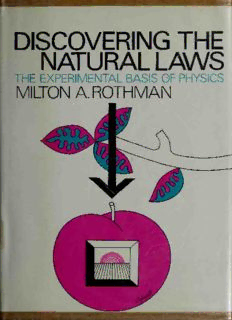Table Of ContentTHE
DISCOVERING
LAWS
NATURAL
THE EXPERIMENTAL BASIS OF PHYSICS
ROTHMAN
MILTON
A.
D.T.N.L.
$5.95
DISCOVERING THE
~
NATURAL LAWS <
cr a -si
THE EXPERIMENTAL BASIS OFPHYSICS
MILTON A.ROTHMAN Q O c *!
CO OC to-S:
z> ^ -c g ;
o
Certainnaturallawsformthefunda- co ir> cc ,
mental basis of physics; over the
centuries these laws have been for-
mulated, tested, andreformulatedin
man's continuing search to define
order and purpose in the natural
world. Thus the laws of physics are
the product of years of hypothesis
and experiment by such men of
scienceas Newton, Helmholtz, Max-
well, and Einstein—men who had
the vision to discover the bases of
order at the foundation of our
universe.
Discovering the Natural Laws
describes the experimental basis of
physics, dealing in depth with the
basic physical measurements that
verify Isaac Newton's classical laws
of motion and gravitation, the laws
of conservation of energy and
momentum, the laws of electro-
dynamics, and the invariance of
the speed of light that forms the
foundation of Einstein's Theory of
Relativity.
(continuedonbackflap)
BURLINGAME HIGH SCHOOL LIBRARY
ESEA TITLE PHASE
I! II
DISCOVERING THE NATURAL LAWS
Milton A. Rothman's career as a scientist originated with
his interest in science fiction as a youth in Philadelphia.
Choosing physics as the field dealing most closely with the
fundamentals of science, Dr. Rothman received a Ph.D from
the University of Pennsylvania in 1952. After several years
as a research scientist in nuclear physics Dr. Rothman joined
the Plasma Physics Laboratory at Princeton University,
specializing in fusion power research.
In the mid-Go's Dr. Rothman found himself, as he puts it,
"going the way of the specialist: learning more and more
about less and less." He chose to expand his horizons by be-
coming a professor in the newly-formed physics department
at Trenton State College. It was through his association with
physics students that Dr. Rothman recognized the need for
a book summarizing the experimental basis of many of the
laws of physics: DISCOVERING THE NATURAL LAWS.
Dr. Rothman is presently preparing a physics textbook for
non-science majors, another outgrowth of his teaching ex-
perience.
Milton Rothman lives with his wife Doris, who is a clinical
psychologist, and their two teenage children in Law-
renceville, New Jersey. Dr. Rothman has written over fifty
technical articles, published in various science journals, and
two books, The Laws of Physics (1963), and Men and Dis-
covery (1964). In addition, his science fiction stories have
appeared in Astounding Science Fiction and, most recently,
in the anthology WHERE DO WE GO FROM HERE, ed-
ited by Isaac Asimov and published by Doubleday.
Discovering the
Natural Laws
•
THE EXPERIMENTAL BASIS
OF PHYSICS
•
MILTON ROTHMAN
A.
Illustrations by the author
BURLIKGAME HIGH SCHOOL LIBRARY
ESEA TITLE PHASE
II SI
DOUBLEDAY & COMPANY, INC.
GARDEN CITY, NEW YORK
1972
Chapter 2 of DISCOVERING THE NATURAL LAWS is an ex-
panded version of an article that first appeared in The Physics
Teacher, Copyright <c) 1970 American Association of Physics
Teachers.
Library of Congress Catalog Card Number 78-171318
Copyright © 1972 by Doubleday & Company, Inc.
All Rights Reserved
Printed in the United States of America
First Edition
25553
THE SCIENCE STUDY SERIES
The Science Study Series offers to students and to the gen-
eral public the writing of distinguished authors on the most
stirring and fundamental topics of science, from the smallest-
known particles to the whole universe. Some of the books
tell of the role of science in the world of man, his technology
and civilization. Others are biographical in nature, telling
the fascinating stories of the great discoverers and their dis-
coveries. All the authors have been selected both for expert-
ness in the fields they discuss and for their ability to com-
municate their special knowledge and their own views in an
interesting way. The primary purpose of these books is to
provide a survey within the grasp of theyoung student or the
layman. Many of the books, it is hoped, will encourage the
reader to make his own investigations of natural phenomena.
The Series, which now offers topics in all the sciences and
their applications, had its beginning in a project to revise the
secondary schools' physics curriculum. At the Massachusetts
Institute of Technology during 1956, a group of physicists,
high school teachers, journalists, apparatus designers, film
producers, and other specialists organized the Physical Sci-
ence Study Committee, now operating as a part of Educa-
tional Services Incorporated, Watertown, Massachusetts.
They pooled their knowledge and experience toward the
design and creation of aids to the learning of physics. Ini-
tially their effort was supported by the National Science
Foundation, which has continued to aid the program. The
Ford Foundation, the Fund for the Advancement of Edu-
cation, and the Alfred P. Sloan Foundation have also given
support. The Committee has created a textbook, an exten-
sive film series, a laboratory guide, especially designed ap-
paratus, and a teachers' source book.
ACKNOWLEDGMENTS
Chapter 2, in a more condensed version, has previously ap-
peared in The Physics Teacher. I would like to thank Dr.
Clifford Swartz, Editor of that journal, for permission to use
that material.
I would also like to give thanks to the libraries of Trenton
State College and Princeton University for their hospitality,
to Miss Nancy Bemarkt for much manuscript typing, to Mr.
Gerald Nicholls for many discussions, and above all to my
family for their patience and forbearance, a necessary in-
gredient of every book.
Description:Accessible, mind-stretching introduction to theories, experiments underlying classical laws of motion and gravitation, conservation of energy, electrodynamics, relativity, other important concepts. Also discussion of antigravity, time travel, other science fiction ideas in light of laws of physics.

